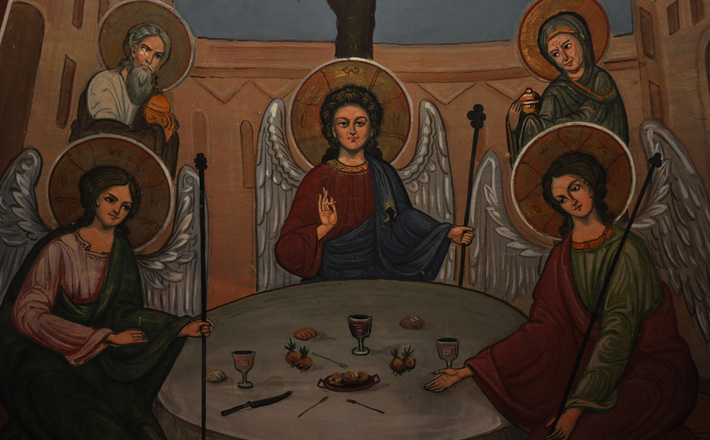Commentary on John 16:12-15
I suspect that most in your congregation would not appreciate a sermon that began like this: “There are things that are essential to our faith, but I can’t speak about them because you would not be able to understand. They are far too complicated and way over your head.”
Really?
Of course, the reality is that there are many dimensions of our life in God that we don’t understand and we may not understand until we are seated at the heavenly banquet. In preparation for that day, I am keeping track of a long list of questions that I want answered. I suspect you, too, have that list.
Likewise, I feel confident that I stand in a long line of people who have asked questions. Moses certainly wanted to know, “If I come to the Israelites and say to them, ‘the God of your ancestors has sent me to you,’ and they ask me, ‘What is his name?’ what shall I say to them?” (Exodus 3:13). Who is this God who has called us? What are your questions? So much seems unanswered.
Therefore, it is disconcerting each and every time I come upon Jesus’ observation that “I still have many things to say to you, but you cannot bear them now.” (John 16:12) What are they? Tell us. Don’t leave us hanging. We want to know. We can take it. We heard about so many things from you. You told us that we are to be merciful, pure in heart, and peacemakers. You explained that we should not worry.
You reminded us that we are to love God and love our neighbor. And you told us that things would not always be easy or go smoothly for us, “If any want to become my followers, let them deny themselves and take up their cross and follow me” (Mark 8:34). The call to take up our cross is definitely a hard saying. What else could you have possibly told us? What did we miss?
In this brief portion from Jesus’ farewell sermon we are not told what those many things are, only that Jesus will not tell us. But, we are told that, in the future; in the unfolding of time, we will be told them. And we are told how we will hear of them. It is the Spirit of truth who will guide us, speak to us, and declare all to us all that we need to know. We are given a portrait of the three persons of the Trinity. Jesus speaks of himself, of the Spirit’s activities, and of the Father.
The Holy Trinity is definitely one of those difficult, challenging, thought-provoking doctrines of our faith. But we should not think of it as an exam question that must be answered before we will be admitted to the heavenly banquet. Nor is the Trinity an IQ test to identify the superior intellects and weed out those who are not worthy. Rather, as Catherine Mowry LaCugna explains her book, God For Us, the Trinity is “ultimately a practical doctrine with radical consequences for Christian life . . . [it] is the specifically Christian way of speaking about God, [and] what it means to participate in the life of God through Jesus Christ in the Spirit.”1
Throughout John’s gospel we are given glimpses of the Spirit. And in John’s gospel the Spirit is associated primarily with Jesus. In fact, we are told that Jesus “said this about the Spirit which believers in him were to receive; for as yet there was no Spirit, because Jesus was not yet glorified” (John 7:29). John the Baptizer gives witness to the fact that, after baptizing Jesus, “’I saw the Sprit descending from heaven like a dove” (John 1:32). He had been told that this would be the sign that this person would be “the one who baptizes with the Holy Spirit” (John 1:33).
Early in his ministry Jesus introduced the Spirit into his conversation with the Pharisee Nicodemus. How central is the Spirit? Jesus declares “no one can enter the kingdom of God without being born of water and the Spirit” (John 3:5). Jesus explained to the unnamed Samaritan woman “God is spirit . . .” (John 4:24).
But it is during his farewell message that Jesus most fully explores and explains the Spirit that he was to give to his disciples: “He breathed on them and said to them, ‘Receive the Holy Spirit’” (John 20:22). And in his farewell message and prayer Jesus weaves the connection between God, the Father, himself, and the Spirit. We have been exploring these relationships as the season of Easter has come to an end.
How are we to know God? We know God because we have known Jesus. In his prayer Jesus reminded us, “you, Father, are in me and I am in you . . . so that the world may know that you have sent me and have loved them” (John 17:21, 23). The proclamations he made, what Jesus taught — “The words that I say to you I do not speak on my own; but the Father who dwells in me does his works” (John 14:10) — Jesus speaks the words of the Father, and the Spirit. The Paraclete “will not speak on his own, but will speak whatever he hears” (John 16:13) from Jesus. The Father speaks to Jesus, who speaks to the Spirit, who will “guide you into all the truth” (John 16:13).
The Holy Trinity is about relationship and indwelling. It is about collaboration and the self-communication of God. The Trinity is about the mutuality of God within the God-head, about our invitation into the God-head by Jesus in the power of the Paraclete. And it is about our mutuality with each other, guiding, speaking, and declaring to one another the glory of God, Father/Creator, Jesus/Son, and Holy Spirit. The Trinity is our way of life made possible by God.
1 Catherine Mowry LaCugna, God For Us: The Trinity and Christian Life (San Francisco: Harper, 1991), 1.


May 26, 2013